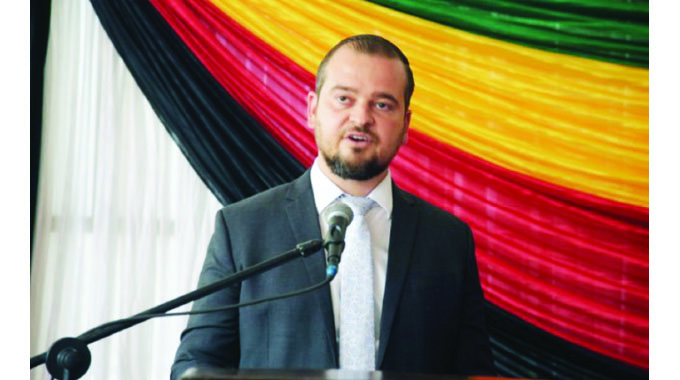Wheat stakeholders urged to think global

Elita Chikwati
Senior Agriculture Reporter
Millers and other private players must develop collaborations, alliances and synergies with regional and international wheat institutions in order to boost production and improve livelihoods of people in line with Vision 2030.
The Government’s thrust is to see more millers and other private players joining contract farming to ensure 40 percent of raw material is achieved by private sector and they will get 60 percent from the Grain Marketing Board.
Lands, Agriculture, Fisheries, Water and Rural Development Deputy Minister, Vangelis Haritatos,said this yesterday while officiating at the wheat annual conference.
Farmers and stakeholders who have contributed to wheat production were also honoured and awarded certificates.
The conference was meant to review performance of the past winter cropping season and mapping the way forward.
Last season, 2020/21 the area under wheat production was 66 435,86 hectares against a target of 85 000 hectares.
This area planted to wheat was 78 percent of the targeted area which is the highest since independence.
Stakeholders agreed that the past season was a success and felt that there was still a challenge on high costs of production. Farmers were also called upon to repay loans especially under the National Enhanced Agriculture Productivity Scheme (NEAPS) for the scheme to revolve.
Deputy Minister Haritatos applauded the private sector for complementing Government efforts to increase wheat production.
“Following the success of the wheat production last season, the value chain has the potential to increase its production reaching national sufficiency and export the surplus.
“Since wheat has to be grown under irrigation the crop is pretty well guaranteed as long as good agronomic practices are implemented.
“The good rains this rainy season mean that irrigation and farm dams are largely full hence this year I expect that we will do it again,” he said.
“The value chain must work together in a co-ordinated manner to ensure the linkages are strengthened by ensuring that our wheat value chain is highly dependent on our locally produced wheat,” he said.
Deputy Minister Haritatos said agriculture occupied a central place in the Zimbabwean economy for employment, incomes and poverty reduction.
“The sector contributes 15-18 percent of Gross Domestic Product (GDP), 23 percent to the total formal employment, and provides livelihoods to approximately 70 percent of the rural population (54 percent of which are women).
“It also supplies about 63 percent of industrial raw materials with the share of agriculture in manufacturing value added at 60 percent, and the share in export earnings at 30 percent,” he said.
Deputy Minister Haritatos said farmers received subsidised rates for water and electricity and said the challenge was on keeping up with the rates.
Zimbabwe Wheat Board chairman, Mr Givemore Mesoemvura, said last season there was an improvement in availability of combine harvesters which saw many farmers harvesting their crop on time.
“We were lobbying for grading of wheat and now it is happening. There was a challenge of lack of skills and on the Zimbabwe Wheat Board in collaboration with the DRSS did training at five sites around the country and work is still ongoing.
“We are calling for the warehouse receipt system or commodity exchange system,” he said.
Zimbabwe Farmers’ Union operations director, Dr Prince Kuipa, said inputs costs were following the market rate which was far much higher than the official auction rate.
“Even though we have the producer price, we have two exchange rates and the parallel rate is the one being used on the market. As we progress into the marketing season, farmers who sell early get more value than those who sell later. It is better to index our producer prices into foreign currency,” he said.
GMB chief executive, Mr Rockie Mutenha, said the parastatal had acquired seven dryers which were used by wheat farmers last season and 13 other were on the way and will be used during this winter cropping season.
World Bank representative, Esther Chigumira, said there was need to promote smart agriculture.








Comments